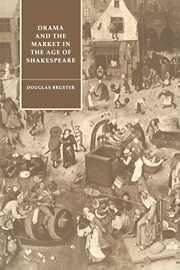Book contents
- Frontmatter
- Contents
- Preface
- Acknowledgments
- A note on texts
- 1 Toward a material theater
- 2 Drama and the age
- 3 “City comedy” and the materialist vision
- 4 Horns of plenty: cuckoldry and capital
- 5 The objects of farce: identity and commodity, Elizabethan to Jacobean
- 6 The farce of objects: Othello to Bartholomew Fair
- 7 “The alteration of men”: Troilus and Cressida, Troynovant, and trade
- Notes
- References
- Index
- Frontmatter
- Contents
- Preface
- Acknowledgments
- A note on texts
- 1 Toward a material theater
- 2 Drama and the age
- 3 “City comedy” and the materialist vision
- 4 Horns of plenty: cuckoldry and capital
- 5 The objects of farce: identity and commodity, Elizabethan to Jacobean
- 6 The farce of objects: Othello to Bartholomew Fair
- 7 “The alteration of men”: Troilus and Cressida, Troynovant, and trade
- Notes
- References
- Index
Summary
This book explores how English drama responded to the market, even as it sprang from it, during the Renaissance. Faced with a relatively unfamiliar but expanding network of commercial exchange, playwrights fastened onto a variety of strategies to understand the dynamics of the market. They did so, of course, from within it, in conjunction with playhouses that were quickly becoming fixtures in the landscape of early modern London. Thus the first part of my argument in this study focuses on the institutional situation of London's playhouses – that is, on how and why theaters came to be theaters when they did – as particular historical pressures called for new means of understanding the material foundations of urban life. Then, in chapters devoted to the economic basis of the cuckold myth, the objective inscription of identity in Elizabethan and Jacobean farce, and the staging of London's market through the Troy tale in Troilus and Cressida, I explore how dramatists came to mythologize the elaborate realities of London's material base.
One strategy involved exploiting the traditional links between sexual and economic transaction, using erotic possession and possessiveness as symbolic doubles for the economic. Although the links between the sexual and the monetary have long been a customary site of cultural exploration, the literature of the Elizabethan and Jacobean eras displayed a special, if anxious, fascination with the topic.
- Type
- Chapter
- Information
- Drama and the Market in the Age of Shakespeare , pp. xi - xiiiPublisher: Cambridge University PressPrint publication year: 1992



